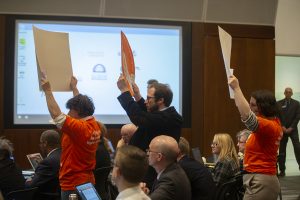Regents approve new policy regarding freedom of expression
The Board of Regents has revisited and approved new language for its policy on freedom of expression, speech, and other First Amendment rights on university campuses.
The Old Capitol building is seen in 2018.
April 18, 2019
The state Board of Regents on Thursday in the Levitt Center approved revisions to its policy on freedom of expression to comply with a bill that was signed into law March 27.
According to the regents’ document, Iowa Code Chapter 261H directs the board to adopt a policy that addresses freedom of speech and expression at regent institutions. The current policy will be replaced with new language accommodating that purpose.
“The board recognizes that the primary mission of the institutions of higher education under its jurisdiction is the promotion of teaching, research, and scholarship,” the document reads.
Regent institutions should provide ample opportunity on their university campuses to engage in the free exchange of ideas, the document said, as embodied in the First Amendment.
The new state law, which advocates for freedom of speech and expression among student organizations, comes after a court battle between the UI and the group Business Leaders in Christ.
“The University of Iowa is strongly committed to freedom of expression and the First Amendment,” UI spokeswoman Jeneane Beck said in an email to The Daily Iowan.
Beck said the core mission of the UI, as a public-research institution, relies on free expression, academic freedom, and the diversity of perspectives. Therefore, she said, UI policies do not regulate displays and rallies in public spaces or deny students their rights.
“The university is strongly committed to an equitable and inclusive campus,” Beck said. “Even free expression and academic freedom have limits.”
For example, she said, threats of and incitement to violence, severe and pervasive harassment, among other actions are not protected on the UI campus, and violators may be subject to discipline, prosecution, or exclusion from the university.
RELATED: Reynolds signs bill addressing free speech on public campuses
The policy manual revision for freedom of expression allows for the regent universities to regulate such activity on their own, in addition to making regents available for complaints by members of the campus community.
“Our public universities are places where all viewpoints should and can be heard and respected,” regent spokesman Josh Lehman has previously said in an email to the DI. “We are aware of the requirements of the law and will make sure our policies are in compliance.”
The revised policy states that the primary function of regent universities is the discovery, improvement, transmission, and dissemination of knowledge by means of research, teaching, discussion, and debate, which, it said, must be fulfilled by intellectual freedom of expression.
“Our public universities already have policies in place to protect free expression,” Lehman said. “This has been a long-standing core principle of institutions of higher learning, and the Board of Regents fully supports the free expression of ideas on our campuses.”
UI President Bruce Harreld told the DI in March that the American way with free speech is to either listen and learn, or move on, as long as there is not an attack on anyone’s personal values. Hate and violent speech is not defined as something people might not like, he said.
“It’s also protecting the values of those on the other side of [an] issue, when they want to speak out and need support,” Harreld said. “That’s democracy, that’s our system. We fight a lot to protect that.”






